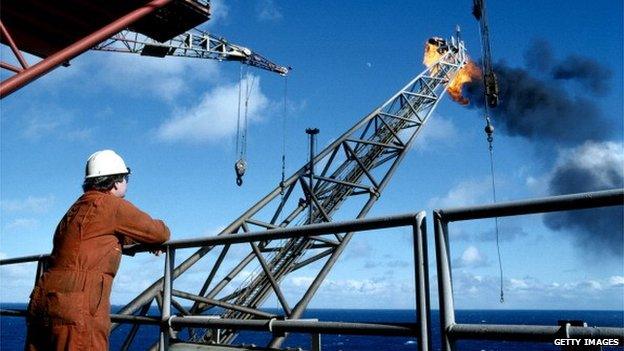North Sea oil giant - do not risk the UK's 'engineering legacy'
- Published
- comments

"It is tough times, we will have to cut our cloth accordingly."
Following BP, Centrica and Shell, the words of Bob Keiller reveal yet another senior oil and gas executive who has bad news and job losses to announce concerning the North Sea.
Based in Aberdeen, 1,000 of Wood Group's 11,000 strong UK work force have left the business since December.
Globally, a further 4,000 jobs have gone. That low oil price is biting. Revenues and profits are down markedly.
Wood Group is in the oil and gas services industry - providing the plumbing for the likes of BP and Shell which explore for and refine oil. Wood Group builds and supports the vital engineering and technical infrastructure to do it.
The whole sector is important, worth 拢27bn to the British economy. Malcolm Webb, the former chief executive of Oil and Gas UK, described it as a "core component of the UK's engineering and manufacturing base" which "enjoys a worldwide reputation for excellence and innovation honed over 40 years at the cutting edge of exploration and production".
And it is for that reason that it is worth listening when Mr Keiller says that - despite the rapid fall in the oil price - the North Sea is still a vital part of the UK's manufacturing future.
"We have a fantastic engineering skills base here in the UK," Mr Keiller said.
"It creates high quality job opportunities that can be exported to many different countries around the world. I have people in Aberdeen designing the most sophisticated sub-sea oil and gas developments for deep water offshore for South America and Africa and elsewhere.
"These high quality jobs can exist way beyond the life of the North Sea."
Engineering skills are a valuable export for the UK and go some way to rebalancing the British economy, seen by many as too reliant on the financial services of the City for comfort.
"[It] often goes unnoticed," Mr Keiller says. "There is a legacy that should not easily be let go. Collectively we need to work together to protect that skills base."
Yes, there are significant headwinds for Britain's oil and gas industry, but the sector still employs 400,000 people.
"The North Sea faced three clear challenges," Mr Keiller says. "Firstly the cost challenge [the sector was operating too expensively], also there was the challenge of the punitive tax regime that was in place; and the regulator wasn't necessarily set up to maximise economic recovery."
There has been movement on all three, with costs and taxes cut and a new regulator in the shape of the Oil and Gas Authority.
I ask Mr Keiller whether the oil price is likely to increase any time soon.
"Anyone who is in the business of predicting the oil price probably gets it wrong so I am not really keen [to make predictions]. At the moment there is no immediate sign of upward pressure.
"We have to assume the conditions are not going to improve."
There could be more job losses - although Mr Keiller is careful to say nothing is planned at present.
But, amid the gloomy predictions, many parts of the North Sea oil and gas sector are thriving.